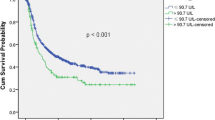Abstract
Background
Serum creatine kinase level has been reported to be a prognostic indicator in breast or lung cancers but no reports have been in esophageal cancer. We analyzed the prognostic significance of preoperative serum creatine kinase level in patients with esophageal carcinoma.
Methods
We evaluated the preoperative serum creatine kinase levels of 148 patients (118 male and 30 female) with esophageal squamous cell carcinoma. According to their median serum creatine kinase levels, we divided the patients into high and low serum creatine kinase groups. Univariate and multivariate analyses were used to evaluate the impact of serum creatine kinase level on the prognosis of the patients.
Results
The tumor depth (P < 0.01) and stage (P < 0.01) were significantly associated with serum creatine kinase levels. The prognosis was worse in the low serum creatine kinase group than in the high serum creatine kinase group (P = 0.02). In the subgroup analysis, although no survival difference was observed in the female patients between the groups (P = 0.171), the survival of low serum creatine kinase group was significantly worse than that of high creatine kinase group in the male patients (P = 0.001). Cox proportional hazard regression analysis revealed that nodal status (P = 0.019) and serum creatine kinase level (P = 0.047) were independent risk factors associated with overall survival in the male patients.
Conclusions
Preoperative low serum creatine kinase level was useful in predicting overall survival in the male patients with esophageal squamous cell carcinoma.




Similar content being viewed by others
References
Yan YB. Creatine kinase in cell cycle regulation and cancer. Amino Acids. 2016;48(8):1775–84. https://doi.org/10.1007/s00726-016-2217-0.
Pan H, Xia K, Zhou W, et al. Low serum creatine kinase levels in breast cancer patients: a case-control study. PLoS ONE. 2013;8(4):e62112. https://doi.org/10.1371/journal.pone.0062112.
Liu L, He Y, Ge G, et al. Lactate dehydrogenase and creatine kinase as poor prognostic factors in lung cancer: a retrospective observational study. PLoS ONE. 2017;12(8):e0182168. https://doi.org/10.1371/journal.pone.0182168.
Takamori S, Toyokawa G, Shimokawa M, et al. A novel prognostic marker in patients with non-small cell lung cancer: musculo-immuno-nutritional score calculated by controlling nutritional status and creatine kinase. J Thorac Dis. 2019;11(3):927–35. https://doi.org/10.21037/jtd.2019.01.76.
Enns DL, Tiidus PM. The influence of estrogen on skeletal muscle: sex matters. Sports Med. 2010;40(1):41–58. https://doi.org/10.2165/11319760-000000000-00000.
Chang CC, Liou CB, Su MJ, et al. Creatine Kinase (CK)-MB-to-Total-CK ratio: a laboratory indicator for primary cancer screening. Asian Pac J Cancer Prev. 2015;16(15):6599–603. https://doi.org/10.7314/apjcp.2015.16.15.6599.
Murayama K, Suzuki T, Shimada H, et al. High and/or non-decreased systemic inflammatory index during treatment indicates poor prognosis in patients. Toho J Med. 2019. https://doi.org/10.14994/tohojmed.2019-001.
Kochi R, Suzuki T, Shimada H, et al. Does preoperative low HbA1c predict esophageal cancer outcomes? Ann Thorac Cardiovasc Surg. 2020;26(4):184–9. https://doi.org/10.5761/atcs.oa.19-00238.
Ito M, Yajima S, Shimada H, et al. High serum PD-L1 level is a poor prognostic biomarker in surgically treated esophageal cancer. Cancer Med. 2020;9(4):1321–7. https://doi.org/10.1002/cam4.2789.
Suzuki T, Shimada H, Nanami T, et al. Prognostic significance of hyperfibrinogenemia in patients with esophageal squamous cell carcinoma. Int J Clin Oncol. 2017;22(3):461–8. https://doi.org/10.1007/s10147-016-1087-5.
Acknowledgements
This work was partially supported by a Grant in-aid JSPS KAKENHI (Grant number 16K10520). The authors would like to thank MARUZEN-YUSHODO Co., Ltd (https://kw.maruzen.co.jp/kousei-honyaku/) for the English language editing.
Author information
Authors and Affiliations
Corresponding author
Ethics declarations
Ethical statement
This retrospective study was approved by the Institutional Ethics Committee of Toho University Omori Medical Center (Tokyo, Japan; #M20196_18056_18002).
Conflict of interest
Hideaki Shimada received research Grants and technical lecture fees from Ono Pharmaceutical Co., Ltd., Taiho Pharmaceutical Co., Ltd. and Chugai Pharmaceutical Co., Ltd. The other authors declare that they have no conflicts of interest.
Additional information
Publisher's Note
Springer Nature remains neutral with regard to jurisdictional claims in published maps and institutional affiliations.
Supplementary Information
Below is the link to the electronic supplementary material.



Rights and permissions
About this article
Cite this article
Murayama, K., Suzuki, T., Yajima, S. et al. Preoperative low serum creatine kinase is associated with poor overall survival in the male patients with esophageal squamous cell carcinoma. Esophagus 19, 105–112 (2022). https://doi.org/10.1007/s10388-021-00866-6
Received:
Accepted:
Published:
Issue Date:
DOI: https://doi.org/10.1007/s10388-021-00866-6




